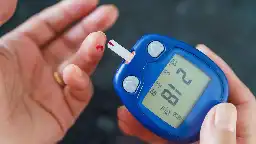health
- High Blood Pressure Monitoring: A Promising Predictor of Heart Health Concernslilliesfriends.org High Blood Pressure Monitoring: A Promising Predictor of Heart Health Concerns.
A new study finds that getting your blood pressure taken while you're lying down may give a more accurate reading that could show signs of heart disease risks.

A new study finds that getting your blood pressure taken while you’re lying down may give a more accurate reading that could show signs of heart disease risks. Even though the new study found something different, researchers agree that sitting up is still the best way to take blood pressure. Experts say that people should make it a priority to know their blood pressure numbers and act on them, because high blood pressure can make someone more likely to have dangerous heart events. New study shows that getting your blood pressure checked while you’re lying down may give more exact results.
Every time you go to the doctor, your blood pressure is taken for a reason. Blood pressure is often a good indicator of serious health problems, like the chance of stroke, heart disease, and even dying too soon.
So, it’s important to get the most exact reading of your blood pressure so you can take care of your health.
The American Heart Association (AHA) gave a talk earlier this month about how a person’s physical position when their blood pressure is taken can affect their blood pressure number, which in turn can affect how well they can predict certain health risks.
All of it comes down to where an adult is when they get a high blood pressure number.
Adults who had high blood pressure both when they were sitting up and when they were lying flat on their backs were more likely to have a stroke, heart failure, die too soon, or have heart disease than those who didn’t have high blood pressure in either pose.
- New antibiotic kills deadly superbug in early testslilliesfriends.org New antibiotic kills deadly superbug in early tests.
Thursday, January 4, 2024 -- A new type of drug has been shown to be effective against a superbug that can kill.

CRAB is the name of a type of bacteria that can cause dangerous infections in the blood, lungs, and urinary tract, according to the U.S. Centres for Disease Control and Prevention. A group of strong medicines called carbapenems can’t kill it, which is a bad thing.
Researchers from Harvard University and the drug company Hoffmann-La Roche found that zosurabalpin, a new type of antibiotic, can kill A. baumannii in a study that came out on January 3 in the journal Nature.
Dr. Kenneth Bradley, global head of infectious disease discovery at Roche Pharma Research and Early Development and researcher, told CNN that Zosurabalpin works in a way that isn’t like anything else on the market.
His explanation was that this was a new way to do things, both in terms of the compound itself and the way it kills germs. It is hard to fight A. baumannii because it is a Gram-negative bacteria, which means it has protective membranes on both the inside and the outside.
Scientists first tried to find a molecule that could get through those double membranes and kill the germs. Then, they worked on making it even better.
Researchers picked one changed molecule after working for years to make many compounds stronger and safer.
How does it do its job? Zosurabalpin stops lipopolysaccharides, which are big molecules, from moving to the outer membrane of bacteria. There, they keep the protected membrane intact. This makes the molecules build up inside the bacteria cell until the cell becomes so poisonous that it dies.
More than 100 CRAB samples were used in the study, and zosurabalpin worked on all of them. It also lowered the amount of bacteria in mice that had asthma caused by CRABs and kept mice from dying of sepsis caused by the bacteria.
Researchers told CNN that Zosurabalpin is now being tried in phase 1 clinical trials to see if it is safe for people to use.
- US sets policy to seize government-funded drug patents if price deemed too highwww.reuters.com US sets policy to seize patents of government-funded drugs if price deemed too high
The Biden Administration on Thursday announced it is setting new policy that will allow it to seize patents for medicines developed with government funding if it believes their prices are too high.

cross-posted from: https://midwest.social/post/6252553
> >Dec 7 (Reuters) - The Biden Administration on Thursday announced it is setting new policy that will allow it to seize patents for medicines developed with government funding if it believes their prices are too high. > > > >The policy creates a roadmap for the government's so-called march-in rights, which have never been used before. They would allow the government to grant additional licenses to third parties for products developed using federal funds if the original patent holder does not make them available to the public on reasonable terms. > > > >White House advisers said on a press call that cost to consumers is a factor government agencies may consider when thinking of using march-in rights. > > > >"We'll make it clear that when drug companies won't sell taxpayer funded drugs at reasonable prices, we will be prepared to allow other companies to provide those drugs for less," White House adviser Lael Brainard said on the call. > > > >. . .
- Antioxidants such as vitamin C found to spur cancer growth & metastasisnewatlas.com Antioxidants such as vitamin C found to spur cancer growth & metastasis
A new study has found that antioxidants like vitamins C and E activate a mechanism that stimulates the growth of new blood vessels in cancer tumors, helping them to grow and spread. The researchers say their findings highlight the potential risk of taking antioxidant supplements when they’re not…

“We’ve found that antioxidants activate a mechanism that causes cancer tumors to form new blood vessels, which is surprising since it was previously thought that antioxidants have a protective effect,” said Martin Bergö, a new study’s author. “The new blood vessels nourish the tumors and can help them grow and spread.” It's worth noting that there's no harm in consuming normal antioxidant-rich foods in normal quantities, though.
- Extreme Heat Is Fucking With Our Headswww.rollingstone.com Extreme Heat Is F-cking With Our Heads
New research shows that rising temperatures could mean an increase in mental health crises.

Over the past several years, increasingly destructive hurricanes, wildfires, blizzards, and other extreme weather events have made it clear that the effects of climate change aren’t some future hypothetical, but our current reality. Not to be outdone, the summer of 2023 has been coming in hot — literally — with July shattering the record for the planet’s hottest month, and coming to a close with “numerous fires” breaking out in the Arctic circle. And while the recent high temperatures and debilitating humidity may not be responsible for as much property damage as a hurricane, it’s been disastrous for our mental health.
- For the Love of God, Stop Microwaving Plasticwww.wired.com For the Love of God, Stop Microwaving Plastic
A study of baby-food containers shows that microwaving plastic releases millions upon millions of polymer bits.

- Over a Billion People Predicted to Be Living With Diabetes by 2050, Study Findsgizmodo.com Over a Billion People Predicted to Be Living With Diabetes by 2050, Study Finds
New research estimates that global cases of the chronic condition will double over the next few decades.

Diabetes cases are likely to skyrocket over the next few decades, new research out this week has found. The study estimates that more than a billion people worldwide will be living with the chronic condition by 2050—roughly double the amount of cases seen today. The prevalence of diabetes is expected to be especially high in parts of Africa and the Middle East, but dozens of countries could experience substantial increases.
Mental Health Apps Are a Privacy Nightmare
Off English
In the simplest terms, diabetes is defined as having chronically high levels of blood sugar. This usually happens due to a breakdown in our production of or response to insulin, a hormone that helps move sugar from the bloodstream to our cells. People with type 1 diabetes, for instance, have an overzealous immune system that attacks the cells responsible for making insulin. And those with type 2 diabetes develop a resistance to insulin’s effects and can eventually stop producing it altogether.
Thanks to medications and better blood sugar monitoring, diabetes is no longer the death sentence it once was. But it can still lead to serious complications like nerve damage and chronic kidney disease, especially if not managed probably. It also often raises the odds of many other health conditions, including heart attacks, stroke, and dementia. And according to the authors of a study published Thursday in the Lancet, the burden of diabetes will only go up from here.
The research comes from scientists at the Institute for Health Metrics and Evaluation (IHME), based at the University of Washington’s School of Medicine. To come up with their predictions, the team used the latest data from the Global Burden of Diseases study, a long-running research project also managed by the IHME that tries to track the prevalence of and harm caused by many health conditions and illnesses.
Based on the GBD data, there were about 529 million people living with diabetes worldwide in 2021. After adjusting for age, the current global prevalence was around 6.1%. But by 2050, 1.31 billion people will have some form of diabetes, the authors found. The highest age-standardized prevalence rate for a large region is projected to be in North Africa and the Middle East, at 16.8%, but nearly half of the world’s over 200 countries and territories will have rates higher than 10%.
“The rapid rate at which diabetes is growing is not only alarming but also challenging for every health system in the world, especially given how the disease also increases the risk for ischemic heart disease and stroke,” said lead author Liane Ong, a lead research scientist at the IHME, in a statement released by the organization.
Over 95% of these cases are expected to be type 2 diabetes. And the single most significant risk factor associated with type 2 was high body mass index. But the authors note that many other important factors, including low levels of exercise, poor diet, and a person’s genetics, can influence the risk of developing diabetes and the potential harm or death it can cause. So preventing or managing diabetes cases now and in the future will require widespread improvements in our environment and availability of health care, the authors say.
“Some people might be quick to focus on one or a few risk factors, but that approach doesn’t take into account the conditions in which people are born and live that create disparities worldwide,” said study author Lauryn Stafford, a research fellow at IHME. “Those inequities ultimately impact people’s access to screening and treatment and the availability of health services. That’s precisely why we need a more complete picture of how diabetes has been impacting populations at a granular level.”
- Health Check: What Are ‘Coffee Naps’ and Can They Help You Power Through the Day?getpocket.com Health Check: What Are ‘Coffee Naps’ and Can They Help You Power Through the Day?
How a coffee before a nap really can help you pay back your sleep debt.

- WHO says no level of alcohol consumption is safe for our healthwww.who.int No level of alcohol consumption is safe for our health
The risks and harms associated with drinking alcohol have been systematically evaluated over the years and are well documented.

What a surprise. /j
- How A Simple Bump Can Cause An Insidious Brain Injury
Well, guess I'm screwed since I bump my head, semicommonly…
---
Also, this is NPR, so it's unsurprising they whitewashed the U.S military.
- Thiamine Deficiency and Aberrant Fat Metabolism: Clues to Adverse Reactions- Hormones Matterwww.hormonesmatter.com Thiamine Deficiency and Aberrant Fat Metabolism: Clues to Adverse Reactions- Hormones Matter
Thiamine deficiency impacts mitochondrial functioning via multiple mechanisms. A new discovery shows just how important thiamine is to mitochondrial health.

- AbbVie Made $114 Billion by Gaming the U.S. Patent System for drug Humirawww.nytimes.com How a Drug Company Made $114 Billion by Gaming the U.S. Patent System
AbbVie for years delayed competition for its blockbuster drug Humira, at the expense of patients and taxpayers. The monopoly is about to end.

Through its savvy but legal exploitation of the U.S. patent system, Humira’s manufacturer, AbbVie, blocked competitors from entering the market. For the next six years, the drug’s price kept rising. Today, Humira is the most lucrative franchise in pharmaceutical history. AbbVie orchestrated the delay by building a formidable wall of intellectual property protection and suing would-be competitors before settling with them to delay their product launches until this year. Over the past 20 years, AbbVie and its former parent company increased Humira’s price about 30 times, most recently by 8 percent this month. Since the end of 2016, the drug’s list price has gone up 60 percent to over $80,000 a year, according to SSR Health, a research firm. AbbVie did not invent these patent-prolonging strategies; companies like Bristol Myers Squibb and AstraZeneca have deployed similar tactics to maximize profits on drugs for the treatment of cancer, anxiety and heartburn. But AbbVie’s success with Humira stands out even in an industry adept at manipulating the U.S. intellectual-property regime.
“Humira is the poster child for many of the biggest concerns with the pharmaceutical industry,” said Rachel Sachs, a drug pricing expert at Washington University in St. Louis. “AbbVie and Humira showed other companies what it was possible to do.”
- girl wins $48.3 million settlement after having all her limbs amputated
Lawyers for the unnamed girl said her parents took her to Frimley Park Hospital in Surrey, southeast England, with a high fever, drowsiness, and vomiting, Metro reported. These symptoms are "red flags for meningitis and sepsis," according to the BBC News, but doctors sent her home with paracetamol, or acetaminophen.
Her parents returned to the hospital when her condition worsened, and doctors diagnosed her with meningococcal sepsis. She later experienced multi-organ failure.
The severity of her sepsis later led to her needing the quadruple-limb amputations, Elizabeth-Anne Gumbel KC, who is representing the family, said, the BBC reported. The girl had above-knee amputations of both legs, and above-elbow amputations of her arms.
Her family argued that if doctors had immediately treated her with antibiotics, she would not have been so ill and might have kept her limbs.
- Doctors trial transplanting pig livers to humans to assist national organ shortagewww.pennlive.com Doctors attempting to make pig livers humanlike to ease national organ shortage
It's all highly experimental. But manufacturer Miromatrix is making plans for first-step human testing — an experiment outside a patient's body, to see how well a bioengineered liver can filter blood.

More than 105,000 people are on the U.S. waiting list for an organ transplant. Thousands will die before it’s their turn. Thousands more never even get put on the list, considered too much of a long shot.
“The number of organs we have available are never going to be able to meet the demand,” said Dr. Amit Tevar, a transplant surgeon at the University of Pittsburgh Medical Center. “This is our frustration.”
That’s why scientists are looking to animals as another source of organs. A Maryland man lived two months after receiving the world’s first heart transplant from a pig last January — an animal genetically modified so its organs didn’t trigger an immediate attack from the human immune system. The FDA is considering whether to allow additional xenotransplantation experiments using kidneys or hearts from gene-edited pigs.
If the Food and Drug Administration agrees, the initial experiment will be outside a patient’s body. Researchers would place a pig-turned-humanlike liver next to a hospital bed to temporarily filter the blood of someone whose own liver suddenly failed. And if that novel “liver assist” works, it would be a critical step toward eventually attempting a bioengineered organ transplant — probably a kidney.
More complex is getting human cells to take over.
“We can’t take billions of cells and push them into the organ at once,” Ross said. When slowly infused, “the cells crawl around and when they see the right environment, they stick.”
- Update: There are 80k total cases of Monkeypox.www.cdc.gov 2022 Mpox Outbreak Global Map | Mpox | Poxvirus | CDC
Mpox (monkeypox) is a viral disease that occurs mostly in central and western Africa. It was first identified in laboratory monkeys. However, it is much more common among animals such as rats, mice, rabbits, and the African Squirrel.

cross-posted from: https://lemmy.ml/post/617067
> U.S already has COVID, imagine the shit show that will happen when Monkeypox continues to spread like crazy. Yet here we are and the U.S still doesn't seem to give a shit. > > Sending love to the immunocompromised; they do not deserve this.
- Undisclosed Financial Conflicts Endemic in Clinical Practice Guidelines
It's one study, so more repetitive studies are needed, but I'm unsurprised.
- Long Term Antidepressant Use Associated With Increased Morbidity and Mortalitywww.madinamerica.com /2022/10/long-term-antidepressant-use-associated-increased-morbidity-mortality/
What a surprise: consuming drugs that damage the body increases mortality.
Don't need to make the conditions for needed health if you can just scam people into getting them amirite capitalists? /s
- Antidepressants suppress microliga activity (aka they suppress the first line of the brain's immune system).
Sources.^[Kalkman, H. O., & Feuerbach, D. (2016). Antidepressant therapies inhibit inflammation and microglial M1-polarization. Pharmacology & Therapeutics, 163, 82–93. doi:10.1016/j.pharmthera.2016.]^[Ohgidani, M., Kato, T. A., Mizoguchi, Y., Horikawa, H., Monji, A., & Kanba, S. (2016). Antidepressants Modulate Microglia Beyond the Neurotransmitters Doctrine of Mood Disorders. Melatonin, Neuroprotective Agents and Antidepressant Therapy, 611–620. doi:10.1007/978-81-322-2803-5_36]
---
This is just pathetic. Those studies are trying to imply that suppression of microliga activity can "improve" depression. They would totally view forcing in unneccessary emotional chemicals to make someone happier as "cUrInG dEpReSsIoN."
I do not want to imagine an immunocompromised person taking these drugs...
- Tiny Robots Have Successfully Cleared Pneumonia From The Lungs of Micewww.sciencealert.com Tiny Robots Have Successfully Cleared Pneumonia From The Lungs of Mice
Scientists have been able to direct a swarm of microscopic swimming robots to clear out pneumonia microbes in the lungs of mice, raising hopes that a similar treatment could be developed to treat deadly bacterial pneumonia in humans.

The drug industry is not going to like this lmao.
- CDC Investigates [2022] E. coli Outbreak with Unknown Food Sourcewww.cdc.gov CDC Investigates E. coli Outbreak with Unknown Food Source
Get the most up-to-date outbreak information here.

- Reminder: The FDA rejected a Salmonella vaccination of chickens, for no reason.
and people wonder why I'm freaked out about my health…
- The Funding Effect: How Drug Manufacturers Design Clinical Trials to Produce Favorable Results | Bill of Healthblog.petrieflom.law.harvard.edu The Funding Effect: How Drug Manufacturers Design Clinical Trials to Produce Favorable Results | Bill of Health
Manufacturers have a strong motivation to promote the effectiveness of their drug, while downplaying the risks, in the FDA approval process.

- Whistleblower warns baffling illness affects growing number of young adults in Canadian provincewww.theguardian.com Whistleblower warns baffling illness affects growing number of young adults in Canadian province
Several new cases in New Brunswick involve caretakers of those afflicted, suggesting a possible environmental trigger

- CMS to raise penalties related to enforce price transparencywww.healthcaredive.com CMS finalizes plans to hike price transparency penalties, extend telehealth flexibilities
The agency is also moving forward with a plan to stop the elimination of the Medicare inpatient-only list, which is a win for hospitals.

first seen on wsj
CMS is increasing the penalty for hospitals that don't post their prices online to be as much as $2 million a year for larger facilities
In a fact sheet for the 2022 Outpatient Prospective Payment System, the agency said its "initial analysis strongly suggests there is sub-optimal compliance" with the price transparency requirements. The original fee was $300 a day for all hospitals, regardless of size.
Starting next year, noncompliant hospitals with 30 beds or fewer will be fined $300 a day and larger hospitals will be fined $10 per bed, per day, up to $5,500 a day. CMS is also requiring that the machine-readable files with pricing information be accessible to automated searches and direct downloads. Some hospitals had reportedly been using hard-to-access files as a tactic for obscuring information.
The American Hospital Association said it was "very concerned" about the change, "particularly in light of the many demands placed on hospitals over the past 18 months, including both responding to COVID-19, as well as preparing to implement additional, overlapping price transparency policies."
Research has shown that compliance with the price transparency requirements is dismal, and experts said it was unlikely to improve without more of a financial hit for noncompliance. A JAMA study published in June found that of 100 randomly sampled hospitals and 100 of the highest-earning, 83% were noncompliant.
That backed up an earlier study from JAMA Network Open that noted a bit more than half of the nearly 5,300 hospitals researchers studied did not have a chargemaster in a machine-readable format as the law requires. Another Health Affairs study reported similar findings.
- democrats continue to struggle to lower drug prices for americanswww.nytimes.com A 30-Year Campaign to Control Drug Prices Faces Yet Another Failure (Published 2021)
Democrats have made giving government the power to negotiate drug prices a central campaign theme for decades. With the power to make it happen, they may fall short yet again.

..“crisis of affordability” for prescription drugs, he proposed a novel solution: allow the government to negotiate better deals for critical medications.
Repealing that so-called noninterference provision has been a centerpiece of Democratic campaigns ever since. Senator Chris Van Hollen of Maryland, a former head of House Democrats’ campaign arm, recalled that “Medicare shall negotiate drug prices” was one of the six planks in the “Six for ’06” platform that helped the Democrats win control of the House in 2006.
“It would mean that the pharmaceutical industry, which has 1,500 paid lobbyists, the pharmaceutical industry, which made $50 billion in profits last year, the pharmaceutical industry, which pays its executives huge compensation packages, and which is spending hundreds of millions of dollars to defeat this legislation, will have won,”
- EndeavorRx is a prescription video game already FDA cleared for use in ADHD and now Doctors are testing it for COVID-19 ‘brain fog’www.theverge.com Doctors are testing a prescription video game for COVID-19 “brain fog”
It could be an accessible option to help patients.

A research team is testing a prescription video game to see if it can help people who have lingering memory and attention problems after recovering from COVID-19. Many people who survived the disease say that they’re often confused and have difficulty focusing, and research studies show that the symptoms can stick around for months after they recover.
Faith Gunning, a neuropsychologist at Weill Cornell Medicine in New York, thinks the EndeavorRX video game might be able to treat some of those symptoms. The game, made by Akili Interactive, made history last summer when it became the first video game to get the Food and Drug Administration’s sign-off to be prescribed as a medical treatment. It’s cleared as a treatment for kids between the ages of eight and 12 with ADHD.
More info at https://www.theverge.com/2021/4/19/22391587/long-covid-brain-cognitive-treatment-video-game-akili
#technology #health #ADHD #covid #brainfog
- Like it, or not – the sugar tax is working in South Africa but it needs to be increased to WHO recommendation levelswww.capetalk.co.za Like it, or not – the sugar tax is working
We are drinking far less of the bad stuff, says Prof Karen Hofman of the Wits Centre for Health Economics and Decision Science.

We are drinking far less of the bad stuff, says Prof Karen Hofman of the Wits Centre for Health Economics and Decision Science.
South Africa introduced a sugar tax of 11% per litre three years ago, significantly below 20% recommended by the World Health Organisation (WHO). Nevertheless, it seems to be doing the job.
Hofman and her team researched the impact of the sugar tax and found large reductions in demand for taxed beverages but no significant changes in demand for untaxed drinks. A similar study a couple of years ago found that households bought 50% fewer sugary beverages.
"Liquid sugar is particularly bad… particularly toxic… Fruit juices were not included [in the tax]. They’re less healthy! … Eat your fruit, don’t drink it!"
Listen to the full audio interview at https://www.capetalk.co.za/articles/413646/like-it-or-not-the-sugar-tax-is-working
#health #sugar #obesity #sugartax #southafrica
- TicWatch GTH is a 'familiar looking' but budget health tracker that can monitor your skin temperature with a 10 day battery life for US$80www.androidpolice.com TicWatch has a new budget health tracker with temperature monitoring
Tons of health features for an affordable price

Interesting that this is a dedicated health tracker so no Android Wear OS (hence the longer battery life) or other apps. It seems more targeted at those that actually don't want a smart watch but just want plain health tracking, along with the temperature monitoring (obviously with Covid in mind). It also has 24-hour heart-rate and respiration monitoring, blood oxygen saturation detection (Sp02), and sleep quality monitoring.
It does also have basic notification alerting as well as some customisable watch faces.
Now that Google (an advertising company) has bought Fitbit this device may be perfectly timed for those wanting to move away from Fitbit. Mobvoi already has an excellent pedigree built up around the quality of their TicWatch Pro range.
See https://www.androidpolice.com/2021/04/13/ticwatch-gth-is-a-budget-health-tracker-that-can-monitor-your-skin-temperature/
#technology #fitbit #health #fitness #covid
- What is a warm flush radiating down from the back of my neck?
Sometimes I have voluntary control over a warm flush that radiates from the back of my neck toward my cheeks, down my back and around my chest, occasionally as far as my biceps and thighs, with a slight bias to the right side of my body. What is this?
- free vector designs that make COVID cute somehowwww.pixeltrue.com High-Quality SVG Free Frontliner Heroes Illustrations
Free Frontliner Heroes Illustrations - This is a pack of high quality illustrations with 24 illustrations in total. Create breath-taking websites, landing pages, projects, newsletters, and presentations. Buy cheap Illustrations without compromising on quality.

Does anyone know good resources around framing this whole thing positively emotionally? All the news coverage and even health guidance I see makes me want to emit a low, ceaseless gurgling sound. Even the "aren't our health workers brave" aspect makes me despair at how poorly we're handling the safety net of it all.
- gas stoves are badearther.gizmodo.com Gas Stoves Are the Scariest Thing in the Kitchen
As a Climate Person, I strongly believe we urgently need to electrify everything and ditch natural gas completely. The problem is, I love my gas stove. But though gas stoves are comparatively easy to cook with, they’re actually incredibly dangerous.

I moved in with someone who lives in a new condo building. Naturally everyone here picked shiny new appliances which means a gas stove. It's a highrise, so the weak hood vent just disperses the air around the condo. New construction means some LEED standard or other means there are only two small windows that open somewhat to the outside. In order for the HVAC's fan to run, it has to be attempting to change the temperature; there is no steady temperature fan-on option.
I also bought an air sensor because of CO2 concerns... but it also measures VOCs and particulates.
And oh my.
How does this not freak other people out?? Is it just that no one is measuring levels of indoor air pollution? If it's this bad in a bougie environment, couldn't it be so much worse for other homes?
Is anyone working on legislation to require vents to the outside?
- How Much Caffeine Are You Consuming?multiplesclerosisnewstoday.com Reducing My Caffeine Consumption Improved My Symptoms
After switching to decaf coffee and tea, columnist Jessie Ace notices she feels much better thanks to the decrease in caffeine.

- MS News That Caught My Eye Last Week: Kesimpta, Ocrevus and Chickenpox, Generic Tecfidera, UTIsmultiplesclerosisnewstoday.com MS News That Caught My Eye: Kesimpta, Ocrevus and Chickenpox...
Columnist Ed Tobias discusses the week's top MS news, including FDA approval of Kesimpta (ofatumumab), a self-administered treatment.



